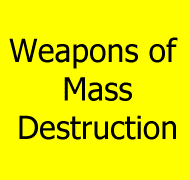





At the time of the Gulf War, the Iraqis possess many chemical delivery systems, including aircraft sprayers, bombs and missiles, multiple rocket launchers, and artillery (from 122mm and larger). However, no chemical weapons were used in the KTO and no chemical rounds were found in captured munitions stockpiles.
There are several possible explanations for this, the most likely being Baghdad's fear of US and multinational Coalition forces retaliation for the use of chemical weapons. Interrogations of senior Iraqi officers revealed they were unanimous in their assertion that there was no intent to employ chemicals, and that there were no chemical munitions issued to their divisions. Most believed that Saddam Hussein recognized that President Bush would react in a manner unacceptable to Iraq if it employed chemicals.
None of the commanders expressed any misgivings about their inability to employ chemicals; most regarded them as a bigger threat to their own poorly equipped Iraqi soldiers. The Iraqi commanders' fear for their own poorly equipped troops was well founded. Many Iraqi soldiers only had masks, but no protective overgarments and there were complaints about the poor condition of decontamination kits. Many mask filters hadn't been changed in years and several units reported that their vehicles' chemical filtration systems were broken.
The Iraqis believed that they would have days or even weeks to move chemical weapons into the KTO once the war began. Thus, the Iraqis miscalculated the Coalition speed of advance; the degree to which their Air Force, artillery assets, and surface-to-surface missile systems would be attrited; and the degree to which their resupply capability would be degraded. The Coalition air campaign dominated Iraq's preferred means of chemical delivery (its Air Force) and made timely ammunition supply impossible. The air campaign also destroyed all known and suspected CW storage in Iraq. In addition, Coalition bombing heavily damaged Iraq's command, control, communications, and intelligence (C3I) system. Iraqi commanders could not control their forces, in part because of an intelligence system failure ot evaluate the developing situation. Allied air superiority established at the start of the air campaign denied Iraq informaiton on Coalition force dispositons, making fire planning practically impossible. The limited information available may have resulted in a decision not to disperse chemicals within the theater until the ground battle became better defined. Destruction of Iraqi chemical weapon production facilities quite likely swayed the decision not to use chemicals. Chemical agents Iraq had produced earlier might have deteriorated in storage, or Iraq might have miscalculated that its defenses would allow it time to produce and deploy chemicals later in the conflict. Loss of its production facilities would have prevented Iraq from making agents as needed, which was the practice during the Iran-Iraq war. Saddam Hussein probably retained personal control of CW during DESERT STORM to allow more complete military evaluations. In such a case, the speed of the Coalition ground offensive together with C3I problems would have complicated and slowed chemical release further.